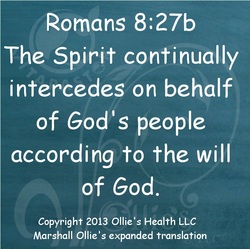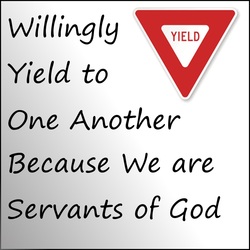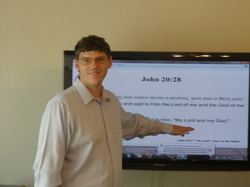I talk about the stuff in my chest in the sermon. I took a picture of all the things in it so you can relate to what I say. Merry Christmas!! May the Lord bless you!
0 Comments
Listen to my sermon as I talk about how I try and change my heart on a day to day basis. I hope that this is helpful to all who want to follow Christ. Below is the insert in the bulletin. I refer to the "questions" several times and read a few of the questions at the end. This is the whole list of questions and the verses so you can use them as you would like. Becoming the neighbor God wants me to be How can I love my neighbor more this week? (1 Cor. 13:3-8) How can I serve my neighbor more this week (Gal. 5:13c: Col. 3:23-24) How can I look to my neighbor's interests this week? (Phil. 2:1-21) What Words can build up my neighbor this week? (Eph. 4:29) Do I need to apologize for anything I said or did this week? (James 5:16) Do I need to forgive my Neighbor for anything? (Luke 18:9-14; Rom. 12:3) How was I selfish this week toward my neighbor? (Luke 18:9-14; Rom. 12:3) What can I do to support my neighbor this week? (1 Thess. 5:11) How can I be thankful for my neighbor this week? (Eph. 5:20)  This verse is always great to remind us that God's Spirit is working on our behalf. Two things often happen. One, we often have hard times and do not think that God cares or that He is with us. It may even feel like He has abandoned us to whatever problem that now consumes our life. This is not true. The Spirit is working on our behalf and God has not forgotten that we are still here in our problems. It may take time, and it may not happen as we want it to, but God knows more than we do if you give yourself over to Him. Two, we go though our life and everything is fine. We do not feel or see that God is working in our life. Doing everything ourselves becomes normal and the status quo. We know that God is supposed to be there, but it does not seem to matter a lot. Luckily, we have most of the things worked out in our lives anyway. This is also not true. We need God in our everyday life to teach us and lead us where He wants us to go. He can show us what love is and who we are to love. We often do not even know what we need to learn, but He does. and much more that we cannot learn on our own. This verse helps me to turn to God and to know that the Spirit is working on my behalf. Yes, that's right, the Spirit of God thinks that we are important enough that He intercedes on our behalf. His interceding is in accordance with God's will which helps me to know that He is trying to point me in the right direction if I am willing to go. Thank you God for working in my (our) life.  I have been studying and translating Philemon for quite some time now. This book has some great themes that can teach all of us how we should be living and thinking about our relationships. When people first look at Philemon they often think, "Why is this book in the Bible?" and "What does this have to do with me?" , but this book was not only written to Philemon. It was also written to his friends and the church. Yes, it was written to the church. What could a letter written to a slave owner about a run-away slave teach me today? How does that apply to the church? Both of these are good questions and are often asked when reading this book. If we look at the relationship that Paul wants Philemon and Onesimus to have and how he wants them to overcome past obstacles, then we get a road map for how we can handle problems in our lives with friends, family, or church members. How we relate and overcome obstacles matters in the church. If you think about what happened in Philemon and try to put it in a more modern setting, I think it helps us to understand what position Philemon was in. I try to think of it in terms of a business deal. If you had a business and had contracted with a person to do your internet for your business for 10 years for 100,000 dollars, but after paying, they left and did not fulfill their contract. How would you feel? You just lost 100,000 dollars. How would you treat this person if they came back to you? This might be a little bit of what Philemon felt, after paying for future service, his slave left him and he was out the lost labor for the whole time he was gone. Paul wants us to love so deeply that past offenses are forgiven and our relationships are transformed to treating each other like family. Paul uses love three times (v. ) and heart three times (v. 7,12,20) in this short letter but he does not use the normal word for heart. He uses the word that literally means entrails or bowels. Paul wants us to love so much that we feel it in our gut! He continues his theme of love by calling Onesimus a beloved brother of Philemon. This shows Philemon that he is not to just love Onesimus but love him as a brother. This is not the kind of love that is a love-hate relationship where you have sibling rivalries and you love your sibling even though you do not like them a lot. This is a love where you and your sibling are very close and care for each other deeply. Next time you have a relationship problem where you are blaming the other person, ask yourself this question, "Am I loving this person as God would want me to love him?" Then think about the answer for a while. This question can be used in your relationship with your friends, kids, spouse, church members, and even your co-workers. It might help us to put love into practice the way God wants us to. Working On Loving Others, Marshall Ollie The VitaPastor  Toleration or tolerance is talked a lot about in the Christian circles, but is rarely clarified. Some say we should have tolerance and other says we should not. Do we draw a line in the sand and go after everyone who crosses it, or do we let people walk all over our line? Is tolerance the equivalent to accepting everything and everybody, or is it something different? I am going to explore what tolerance is in the Bible. I hope to clarify what Christian tolerance is and have you think about what place tolerance has in your life. A good place to start is with the Greek word for tolerance which is "anechomai". This word means, "to put up with, endure, or to bear with someone" and is used in several places including Ephesians 4:2 and Colossians 3:13. Ephesians 4:2 says we should tolerate each other in love as we are living our lives in a manner worthy of Christ. We are not to just "put up with" or "bear with" each other, but we are to do this in love. We do not have to agree on everything. On the contrary, by the very definition of the Greek word, we do not agree, but we put up with the person, in love, for the sake of unity. We would not have to tolerate them if we agreed. Let us look at an example of how we should deal with the poor. Maybe you lay out a case from scripture that shows that the poor were taken care of by government rules (ie. gleaning) and therefore, you are for some sort of government intervention in helping the poor. On the other side, maybe you show from scripture that it is the church's job to take care of the poor and therefore, you are for private non-profits and church's helping the poor. Are either of these positions so far out that we cannot tolerate each other? Do they break down Christ's message? I would say no. Can and should we have strong beliefs based on the Bible? Yes. Should we tolerate others that have different beliefs than we do? I would say yes. Let's clarify a little more about tolerance. The Bible advocates toleration of people not toleration of ideas. We are to tolerate, put up with, bear with people, not ideas. We can agree to tolerate each other and still strongly disagree in love. We can hold our convictions on issues and politics while tolerating each other and all the while having unity in Christ (if your beliefs are within orthodoxy). The media seems to push toleration of ideas which means that in order to have toleration for someone we must agree with them. This is not what the Bible is talking about. You can still disagree and have toleration for someone. Toleration is needed for Christian unity. Can Christians have unity even though they are a republican or a democrat? Are we about how much government we should or should not have in our lives? I would say that we should be about Christ! We can have differing opinions based on scripture and still tolerate each other. However, many times we draw the line in the sand over issues that are not central to our faith or unity. As Christians there are some convictions that are central to our unity. Among these convictions are the identity and nature of God, our sinful nature, and the way we are forgiven and accepted. Another thing that I think is very important for Christians is that we see holiness as God does, and agree with Him and the Bible on His standard. If you do not have these beliefs, then we can tolerate you and may agree with you politically, but we do not have unity in Christ with you. These convictions and beliefs, along with toleration of smaller points of difference, are what bring us to have unity in Christ. In short, while we need to have toleration for each other on issues that are not central to our faith, there are still standards on what make us brothers and sister in Christ. Furthermore, having different standards and beliefs are not contrary to loving someone in Christ. We should have convictions based on scripture, while tolerating Christians that have different opinions on issues that are not central to faith in Christ. Blessings, VitaPastor  I did a sermon recently on Ephesians 6:1-9 and I saw some interesting things. I saw the big details, that this passage is about two relationships; the parent-child and the slave-master. I also saw that these two things do not seem to have much in common, but they have one surprising similarity. Both relationships are about submitting to one another. This section starts back in 5:21 with the statement, "submit to one another". Then Paul goes on to tell us how this principle is applied in different relationships. The relationships in this section do not seem to be ones you would think of as submitting to each other. Parents submitting to their children and masters submitting to their slaves does not seem to be the normal order of things. What is Paul trying to teach us in this section? Paul tells us that children must do what their parents say, but this does not give parents unfettered control. Fathers are not to provoke their children to anger, which might mean explaining why his children are getting disciplined or not having rules that conflict. Even though the parent is not given unlimited control their role is clearly spelled out in other texts like Proverbs - where it says that it is the job of a parent to discipline and give instruction to their children and this is for their benefit. The parent submits to their child by doing what is best for the child. Viewing relationships through the eyes of God can often turn everything on its head. Here we see that the master is told that he is a slave of God. This has implications for what the master can do and how far his authority goes. His authority only goes as far as God (his master) lets it go. This passage goes on to say that the master is to do "the same as the slave"! The slave is working for God and the Master is called to work for God too. The master is to do good, knowing that, as a slave of God, his actions are accountable to God. All of this takes the position and status of the master and turns it into service to God. Both the slave and the master are submitting to God and in so doing so are submitting to one another. This principle of submitting to one another levels the playing field of position and status in this world. If we are bosses, pastors, professors, senators, or even the president, we are all slaves of God and should do good to those under us. God does not give special privileges to those with titles, degrees or status. On the contrary, He treats everyone the same. He will make things right in the end and will reward those who do good. Blessings, VitaPastor  What might living out our Christian faith look like? Christians are to be known for their love. Christ showed us this love in His life and death. However, following in His footsteps is not always as easy as you might think. Love sounds simple enough until you see how the Bible defines love. It describes love in 1 Cor. 13:4-8. It says that love is not self-seeking and it does not keep a record of wrongs. This raises the bar from love just being an emotion to having love be a standard of how we act and think. If we truly love, we can no longer bring up past sins of our spouse or friends to help us win an argument. If we truly love, we will not look to our own self interest, but to the interests of others - which could mean that we give up what we want for them. 1 Corinthians helps us to start to understand what love truly is. However, this verse only opens the door of our understanding of love, for we know that God is love. We think of love as something we have for family and friends, but this is only the beginning of love. God calls us to love our enemy and He showed us the love we should have for the least of these in this world. He wants us to love the poor people, drunks, and prostitutes of this world. Yet we often look in different directions than Jesus would. We condemn the drunks and prostitutes. We tell the poor that it was bad luck or that they should do more and work harder. We often do this without knowing their situations or helping them as God would want us to. Does the Bible say to judge the poor or to help the poor? Are we loving as God would have us love? Let's struggle to put into practice a Godly love that goes beyond our first impressions of love and transforms our lives. Love involves sacrifice and being selfless, which goes against our natural tendency. Our culture feeds our natural tendency and is always telling us that everything is about us. We tend to live this way, but God (the Bible) may call us to give things up and to focus on Him and others. We may not want to give up things we think matter, but God has put His Spirit in us to guide us in His ways. Let's think about what God would want us to do and listen to His Spirit in us. This will help us to love in a Godly way and push us to grow in love. True love is harder than we often think it is. Love may require us to give of ourselves, our time, our energy, our money, our encouragements, etc. Let's strive toward love and not just wait for it to come to us. Let us be known for our love and love as God would have us love. How can you love more like Christ? Pastor, Marshall Ollie http://www.vitapastor.com/contact-us.html  Many of us work to get currency that we then can spend on food, clothing, gas, housing. etc., but most of us cannot afford the Rolex and Ferrari that are associated with the very rich. Paul states in Ephesians that we have riches that vastly outweigh anything that can be had in this life. We who believe have the riches of Christ, and the riches of His grace. Paul states six times in three chapter that we have riches. Each time we learn a little more about what these riches are. We see that we have the riches of His grace (1:7) shown in Christ (2:7) and the riches of His glorious inheritance in the saints (1:18) that were set forth in Christ. The riches do not stop here. We have the riches of His mercy (2:4) and the riches of His glory (3:16). These riches give us strength with power through His Spirit, ground us in love and help us to comprehend Christ's love as we are filled with the fullness of God. Wow - what riches we have! All these riches were given to us as a free gift in Christ Jesus. Christ did the work and we get the benefit! They are the unsearchable riches of Christ (3:8). After reading these passages I took some time to just think about how great a gift grace, forgiveness and mercy really are. I know I have these gifts, but I rarely sit and reflect long enough or often enough on these profound gifts. We have them because of God's love and grace, which is shown to us in Christ's death and resurrection. I would ask you to sit and think about the riches you have in Christ, or the riches you could have in Christ, if you do not believe yet. We all may think that we are "good enough" or "good people" but the truth is without forgiveness we would have God's judgement because God's standard is perfection. In Christ we not only are forgiven for our sins, but we are called holy. We are called the holy ones of God. The riches of Christ are not to be had by working hard or paying a lot for them. The only way to get them is for free from Jesus Christ who bought them for all of us. Praise God. We are rich in Christ. Pastor Marshall |
AuthorMarshall has been a pastor for fifteen years and has been reading clinical studies about vitamin for 20 years. He has a passion for health and following God. Archives
December 2016
Categories
All
|



 RSS Feed
RSS Feed